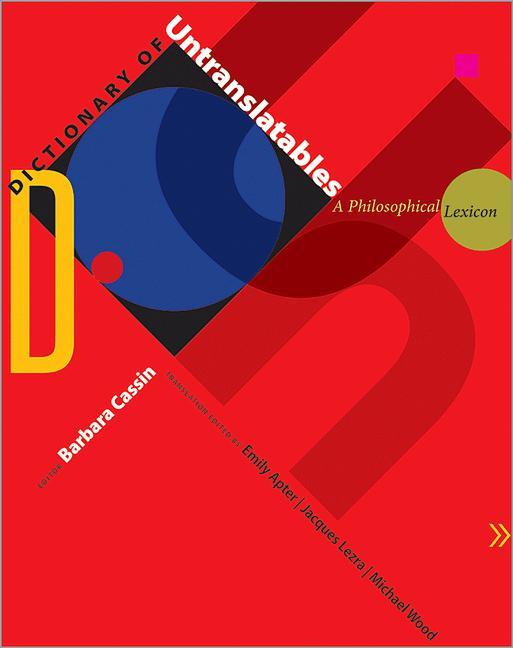For those with a serious interest in languages and in translation, the newly released
Dictionary of Untranslatables: A Philosophical Lexicon (Princeton University Press, 1,448 pages) should be an invaluable and most welcome reference. Originally written in French and now available in English for the first time, the book has put together close to 400 important philosophical, literary, and political terms from over a dozen languages that defy easy translation to other languages and cultures.

More than 150 distinguished scholars contributed to this encyclopedic work that was edited in the original by French philologist and philosopher Barbara Cassin. It describes the origins and meanings of each foreign-language term, the history and context of its usage, its translations into other languages, and its use in notable texts. Its objective is to capture, chart, and explain shifts in the usage of philosophical terminology of Occidental philosophy that emerged from classical antiquity, winded out of the European Middle Ages through the Renaissance and the Enlightenment, and split into streams of continental and analytic schools in the postmodern era.
In a review of
Dictionary of Untranslatables, Matthew Battles, senior researcher at Harvard University’s Berkman Center for Internet and Society, says that despite the great disparities in their respective power and reach, “the tiny but piquant bouquet of world languages” that had made an impact on academic philosophy—namely Arabic, Basque, Catalan, Danish, English, French, German, Greek, Hebrew, Hungarian, Latin, Polish, Portuguese, Romanian, Russian, and Spanish—gained much in vitality and endurance from the dialogue they engage in with the world’s world languages.
“The uncanny, necessary impossibility of translation has long fascinated philosophers,” says Battles. “And yet as the
Dictionary points out, ‘even relatively simple words chase each other around,’ perpetually, surprisingly, conversationally. We struggle with poetry and abstraction, the force of eloquence and the ambiguity of utterance. Meanwhile, languages go on speaking to one another.”
Read Matthew Battles’ review of Dictionary of Untranslatables at BarnesandNoble.com now!Read Adam Gopnik’s “How much really gets lost in translation?”, a contrarian review of Dictionary of Untranslatables, in NewYorker.com now!OTHER INTERESTING READINGS:Simply a bad idea. In “A Dozen Words for Misunderstood,” an article that came out in the May/June 2014 issue of
Pacific Standard magazine, Graeme Wood reviews American linguist and political commentator John McWhorter’s latest book,
The Language Hoax: Why the World Looks the Same in Any Language, which seeks to debunk the so-called Sapir-Whorf hypothesis that the languages that people speak shape the thoughts they think. Wood’s verdict: that McWhorter’s book should convince any doubters that strong-form Whorfianism is “a bad idea whose time will never stop coming.”
Read Graeme Wood’s “A Dozen Words for Misunderstood” in PacificStandardMag.com now!Damn if you don’t. In “7 grammar rules you really should pay attention to," an article that came out in the March 14, 2014 issue of the digital magazine
The Week, American writer and educator Ben Yagoda says that although he’s tough against bogus grammar “rules” that aren’t worth our time, there are still plenty of legitimate rules that we should be aware of. “Not following them doesn’t make you a bad person or even (necessarily) a bad writer,” he explains. “(However]) you’re likely to be judged harshly by an editor you want to publish your work; an executive who, you hope, will be impressed enough by your cover letter to hire you; or a reader you want to be persuaded by your argument.”
Read Ben Yagoda’s “7 grammar rules you really should pay attention to” in TheWeek.com now! Long run ahead for English. In “Johnson: Simpler and more foreign,” a Books, Arts and Culture commentary in the July 3, 2014 issue of
The Economist magazine, R.L.G. writes from Berlin that English has a very long run ahead of it as the lingua franca of the future, contrary to British scholar and author Nicolas Ostler’s prediction that English’s time is coming to an end, to be replaced by machine-translation tools that will remove the need for people to learn to speak, read and write a lingua franca. “English may simplify because it is spreading,” R.L.G says. “But it is spreading because it is expressive and useful. Most of the world’s languages would love to have the problems that English has.”
Read “Johnson: Simpler and more foreign” in Economist.com now!